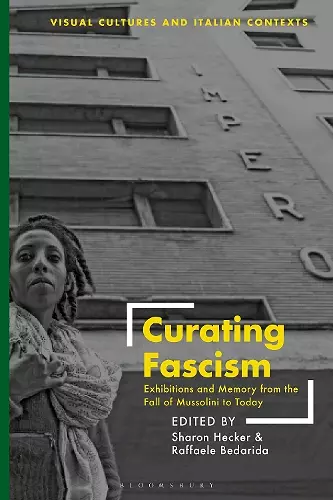Curating Fascism
Exhibitions and Memory from the Fall of Mussolini to Today
Dr Sharon Hecker editor Raffaele Bedarida editor
Format:Paperback
Publisher:Bloomsbury Publishing PLC
Published:15th Dec '22
Should be back in stock very soon

100 years after Italy's National Fascist Party came into power, this book examines the ways in which exhibitions since the fall of Benito Mussolini's regime have shaped historical narratives and political discourse around the Italian ventennio.
On the centenary of the fascist party's ascent to power in Italy, Curating Fascism examines the ways in which exhibitions organized from the fall of Benito Mussolini's regime to the present day have shaped collective memory, historical narratives, and political discourse around the Italian ventennio. It charts how shows on fascism have evolved since the postwar period in Italy, explores representations of Italian fascism in exhibitions across the world, and highlights blindspots in art and cultural history, as well as in exhibition practices.
Featuring contributions from an international group of art, architectural, design, and cultural historians, as well as journalists and curators, this book treats fascism as both a historical moment and as a major paradigm through which critics, curators, and the public at large have defined the present moment since World War II. It interweaves historical perspectives, critical theory, and direct accounts of exhibitions from the people who conceived them or responded to them most significantly in order to examine the main curatorial strategies, cultural relevance, and political responsibility of art exhibitions focusing on the Fascist period. Through close analysis, the chapter authors unpack the multifaceted specificity of art shows, including architecture and exhibition design; curatorial choices and institutional history; cultural diplomacy and political history; theories of viewership; and constructed collective memory, to evaluate current curatorial practice.
In offering fresh new perspectives on the historiography, collective memory, and understanding of fascist art and culture from a contemporary standpoint, Curating Fascism sheds light on the complex exhibition history of Italian fascism not just within Italy but in such countries as the USA, the UK, Germany, and Brazil. It also presents an innovative approach to the growing field of exhibition theory by bringing contributions from curators and exhibition historians, who critically reflect upon curatorial strategies with respect to the delicate subject of fascism and fascist art, into dialogue with scholars of Italian studies and art historians. In doing so, the book addresses the physical and cultural legacy of fascism in the context of the current historical moment.
Fifty years going since Susan Sontag’s Fascinating Fascism, we have in this marvellous volume a fascinating kaleidoscope of historical and critical perspectives on the art world of Fascism. Grounded in rigorous questions about aesthetics and contexts, the volume brings into lively conversation successive generations of curators, critics and historians from all over the Atlantic World—Italy, Brazil, the USA, Canada. It is in itself like the opening of an exciting exhibition, curated with empathy, loaded with striking and beautiful images, and, above all, guided by a strong, critical collective eye for the many diverse, often controversial ways of looking at the art and artefacts that have yielded the fascist aesthetic, itself so varied, elusive and insidious. * Victoria de Grazia, Moore Collegiate Professor of History, Columbia University, USA *
What ethical debts do museums owe to their objects of study—particularly those inextricable from a totalitarian regime? At every turn, this exciting volume unsettles the presumed neutrality of curatorial selection and display, underscoring the often unwitting political contingencies attendant upon seemingly straightforward exhibition strategies. * Ara H. Merjian, Professor of Italian, New York University, USA *
In confronting a critical lacuna in our understanding of postwar history and memory in Italy – the complex and problematic ways in which the art of the Fascist era was displayed after the fall of the regime – Curating Fascism presents an insightful and disturbing picture of a past that has yet to be faced. * Marla Stone, Andrew W. Mellon Professor of the Humanities, American Academy in Rome, Italy *
A pivotal and fresh reconsideration of cultural politics in the fascist era, through the lens of a selection of historical and recent exhibitions that have shaped the interpretation of the ventennio over time. * Ester Coen, Professor of Art History, Università degli Studi dell’Aquila, Italy *
The publication of Curating Fascism, then, is a long-awaited and vital contribution to the fields of art history, museum studies and curatorial practice, one which leads the way for further investigations of the intricate dynamics at play in the politics of display and the reception of art created under totalitarian regimes. * Art History *
This masterly book provides an extraordinary in-depth look at the untold story of postwar exhibitions on fascism. An international and interdisciplinary group of scholars, raisesd the fundamental question of how these exhibitions have shaped historical narratives and collective memory in Italy and abroad. Subverting the usual categories, historical studies and direct accounts guide us in understanding the peculiar difficulties in exhibiting the works of the fascist era, the related curatorial responsibilities, and the legacy of fascism in the current historical moment. * Laura Iamurri, Professor of Art History, Università degli Studi Roma Tre, Italy *
Methodologically rich and innovative, Bedarida and Hecker’s book provides a much-needed intellectual history of postwar exhibitions on fascism. It addressed the multidimensional specificity of the art show by integrating architecture and exhibition design, curatorial practices and institutional history, cultural diplomacy and political history, as well as theories of viewership and the construction of collective memory. This groundbreaking approach opens new avenues for research in areas that are only briefly explored in the book. * Issues in Contemporary Jewish History *
ISBN: 9781350229457
Dimensions: 232mm x 156mm x 18mm
Weight: 683g
320 pages